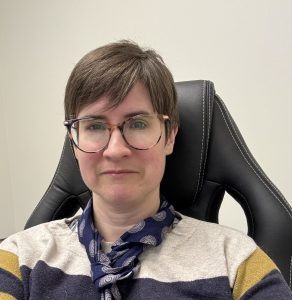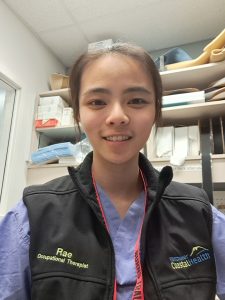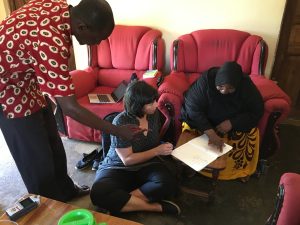This year, our alumni Q&A features both recent and not-so-recent graduates from our department! Read on to learn what they’ve been up to, what surprises and challenges they’ve faced since graduation, how their UBC training has influenced their trajectories, and what they miss about student and/or linguist life.
Carrie Gillon (Ph.D. 2006, BA. Hons. 1998)
Currently, I’m a Linguist & Language Revitalization Researcher for the Squamish Nation — essentially, I’m their in-house linguist. I work closely with the Squamish Language Commission, write grants, teach linguistics at Simon Fraser University but for the Squamish Nation, and work on the second edition of the dictionary (among other things).


Carrie Gillon at work
I’m also the co-host of the Vocal Fries, the podcast about linguistic discrimination. Mostly we interview other linguists about anything related to linguistic discrimination, but sometimes other people too. Sometimes my co-host Megan Figueroa and I just talk to each other. … Helps keep me sane.
For a variety of reasons, I ended up leaving academia, and moved back to Vancouver during the height of the COVID-19 pandemic. … In some ways it’s unsurprising that I’m here, but it was a very weird path back. Figuring out what to do post-academia was a struggle, and I’m weirdly grateful that the pandemic forced my hand.
As it turned out — the most valuable part of my UBC training was working with Squamish speakers and the Nation. Very obviously related to my current job! … What I miss most about life as a UBC student is the flexibility of the academic year. Just having the time to sit and think. Going to weekly colloquia was also fun and stimulating.
Rae Lee (B.A. Speech Sciences, 2022)
I’m an Occupational Therapist at Vancouver General Hospital on the Acute wards — currently in the ICU, and in Burns Trauma High Acuity. My job is to see people after injury or illness lands them in the hospital, assess their capacity to do everyday tasks, and then make recommendations for rehab, equipment, and other support that will help people be discharged safely. I also work on many other wards and see patients with all kinds of diagnoses including strokes, spinal cord injuries, organ failure, burns, traumatic injury, substance overdose, and more.


Rae at work, inside a splinting room
The most surprising part of my job involves seeing what the human body is capable of recovering from, and also on the flip side, what can land someone in the ICU! I’ve had a patient come out with fewer deficits having jumped from the Lions Gate Bridge than someone who fell down a 7-step flight of stairs… The most challenging part is seeing people recovering from the worst day(s) of their life. There’s a lot of grief for life and function, and sometimes we have to contend with death. At the same time, what a privilege it is to get to play a part in such a pivotal time of someone’s life!
My UBC linguistics training has been most valuable in preparing me to deal with practical communication problems. In the ICU, patients might be hoarse after having breathing tubes freshly removed, they might have paralysed diaphragmatic muscles that make speaking loudly challenging, or they might have other communication difficulties. Understanding different communication strategies, how and where sounds are produced, and swallowing mechanisms, all allow me to work with SLPs and other to be better at my job.
What I miss most about student life is the time and space to digest and integrate new information. These days when I’m learning on the job, it’s often a crash course just before I apply something for the first time on a real human! I find myself missing the chances in school to learn, digest, and apply a lesson several times in practice before doing it for real. … What I definitely don’t miss, though, is homework.
Rachel Soo (Ph.D 2023)


Rachel (right) and Maisy.
I’m the Digital Services Manager at a research and software company called Kwusen (meaning “star” in Comox Sliammon) in Victoria, BC. I provide training on digital tools that support over 50 Indigenous communities in field-data collection as well as management of research data and consultation tracking. I work with research and software folks, communicating customer and client needs — and as the only linguist in the company, I’ve also had the opportunity to inform the design of a language object in the software.
The most challenging thing about this career path in Indigenous consultation has been how much there is to learn and how few resources there are to do so. There’s an entire field of work in Indigenous consultations and rights & title, but virtually no dedicated university programs or online courses available to learn about what one does in this space. Those who hold historical knowledge and current norms come to be experts simply by spending time in this field. … The best thing about this career path is the feeling that I’m actively honouring a commitment to reconciliation.
The project and people management skills I gained during my PhD work at UBC have been incredibly useful in my current job. I also had the opportunity to learn how to learn new skills! If I hadn’t had that training — including exploring new approaches, making mistakes, building a team to bounce ideas off of, asking questions, identifying common goals, etc. — my job would have been much harder. But meanwhile: I miss lots of things about student life, working in a lab and doing experiments. I don’t do much behavioural research or data wrangling, and I miss getting to ask fun questions and having the time to try and answer them. I also miss not having to worry about when the bank will close (… FYI it’s 4 pm and jobs generally end at 5 pm! What’s up with that?)
Leora Bar-el (Ph.D 2005)
I’m Professor of Linguistics at the University of Montana, and I’m currently the Director of the Linguistics Program. Recently, I was also fortunate enough to spend the 2023-2024 academic year as the Torgny Segerstedt Visiting Professor at the University of Gothenburg, Sweden (which I hadn’t anticipated being part of my career path!)


Leora with speakers of Kami (East Ruvu Bantu) in Tanzania.
One of the best parts of my job is working with students — and that’s one of the things my professional training at UBC prepared me for! The attention I give to training my students is modeled after the dedication that my professors had to their students.
The fieldwork training I got at UBC has also been invaluable, and helped me ease right into data collection on fieldtrips to Tanzania. Being trained by experts in Salish linguistics who are also committed to supporting community language work helped shape me into the type of researcher I am today. … It can be challenging to encounter folks who are unaware of the field of linguistics, the value of linguistic diversity, or the variety of Indigenous languages spoken in Montana and across the US. But I suppose I take this these encounters as opportunities.
As for my next big thing: I have a research collaboration with a colleague in Sweden and a colleague in Tanzania, and I am excited about our upcoming research project, which focuses on actional classes in two East Ruvu Bantu languages spoken in Tanzania.
As for what I miss: I do miss being a student, with fewer administrative responsibilities ;). I miss the vibrant research environment. I am so grateful to have had the opportunity to work with the Skwxwú7mesh community – I miss that work and the many individuals that I was fortunate to work with. And I miss Vancouver (but I don’t miss the rain.)


